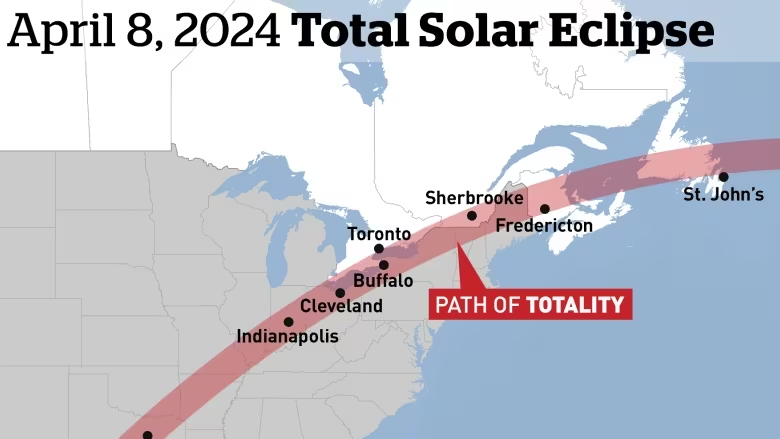You have to wonder what the productivity costs were of last Monday’s (April 8th) much anticipated, observed, and commented on celestial event. And was it really worth it?
Worth. Now there’s a loaded term, much like the notion of quality as I discussed in some recent posts, here, and here. And the reason? It’s substantially a subjective, qualitative notion, not an objective, hard concept. Worth, unlike productivity, can’t be measured easily. It’s difficult to assign dollar values to the price of it, maybe even the costs. You can offer a supercar Lamborghini to an exclusive market for $2 Million (USD!) and someone will buy it. The manufacturer can probably give you a pretty firm figure of the cost of producing and selling that supercar. But was it worth it? That’s what makes the ‘dreary science’ fascinating: economics is about human behaviour in the material world.

Productivity? or Pleasure?
Of course, many people who experienced the eclipse with enthusiasm and satisfaction would definitely claim it was ‘worth it’. But the price, or the cost, of this experience can’t be measured. The cost of lost productivity from the distraction of the eclipse may be calculable, but are we missing something here?
I had planned to write about the eclipse weeks ago, particularly since the theme of the last few posts on this blog had something to do with solar influences on human preoccupation with temporal events, e.g. notable dates in the calendar, and for that matter the human determination to mark time with the invention of a calendar. It seems human beings are the only life form (on this planet at least) which has a conscious awareness of time and the determination to track it, measure it, revere it. Think Cheops tomb, Stonehenge (and many other henges), the Canadian War Museum.
But by the time the eclipse had come and gone, and reported on, it seemed to me my faithful readers (not to mention my unfaithful readers) would have tired of all this. People needed to get back to their ordinary daily lives. Two hours of excitement (never mind three minutes of actual mid-day darkness) was enough. People are bored with eclipses. Until the next one.
It reminded me a bit of the Kentucky Derby: the fastest two minutes in sport. Days and hours of anticipation, then, finally, they’re off; then the replays and post-mortems, and then, on to the next distraction.

Those who lived in the continental sweep of Monday’s (April 8th) solar eclipse almost certainly suffered their share of distraction, and consequent loss of productivity. Those who visited the regions covered by the arc of the eclipse, or decided to take the day off, had already committed to losing a day of productive work.
It is said that planned idleness (vacation, rest, socializing) should not be counted against productivity measures. Even the omnipotent, omnipresent, omniscient Creator laboured six days and on the seventh, rested. (You gotta wonder why such a triple O power would be tired but let’s just leave that one.) Behavioural scientists, and students, report that excessive work reduces performance, output, accuracy and quality. All work and no play makes Jack (and presumably Jill) a dull boy/girl. So a little distraction contributes to sustaining higher levels of performance.
Monday’s event provided a significant distraction and it would have taken a substantial amount of discipline (self and other) or locked doors and blacked-out windows to keep people’s minds focused on their work. Fear is a great motivational tool (at least in the short term) and much of that tool was used to control behaviour on Monday, if not contributing to productive performance. We were constantly being warned that if you look at the sun directly without eye protection you could damage your eyes, even go blind! Parents and kids were warned of this big risk months before the event by their caring concerned School Boards[*]. Kids in some districts were locked in their school rooms with strict admonition against looking at the sun; in other jurisdictions kids were locked out of their schools throwing the problem back to the actual parents of these poor ignorant[†] children. How many working moms and dads had to forfeit a day at work in order to supervise their kids because the school boards deflected their duty to care for the kids. Talk about productivity loss.

Sun gazers at Parliament Hill
And what about those thousands and millions of flimsy glasses with allegedly the right degree of filtering to protect the proactive voyeur from burning his/her retinae? I heard of one proactive person who ordered five pair of those eye shields, months ago, on-line, for $79, USD, only to find, closer to the event, schools and libraries in the path of the eclipse were giving them away[‡]. The manufacturers would of course have benefitted from this windfall demand and revenue but likely the manufacturers were all Chinese, adding no productivity bump to American and Canadian economies. And, were all those shields manufactured to the correct standard? How many people unknowingly bought poor quality eye shields and suffered harm to their eyes? And now there is the question of disposal of these now useless devices. What was the productivity loss for all this?
I didn’t buy sun shades. I didn’t plan on personally monitoring this solar-lunar-earthly alignment. I already knew, from experience (this is my third or fourth encounter with a solar eclipse, even if only partial, but amazingly I can’t quite remember when those were), there isn’t much to look at. And there was a high probability that it would be cloudy that day. I also knew that if it wasn’t cloudy that you could glance up at the sun but it is so bright you can’t hold it for more than a second and have to look away. Our best images are those we see on tv, captured by professional equipment and high-quality recordings. Eclipses happen almost every year, somewhere, and the media are happy to show yet another picture of the disc of moon gliding over the sun, obstructing our light for a few minutes. So why all the fuss? distracting us from our important work.
I had every intention of gluing myself to my office chair, fingers struggling with keyboard, eyes focused on the computer monitor, determined to continue to meet my schedule for finishing R3 of Alex’ Choice. The problem is, my home office faces south and sunlight begins to stream into my office window from about 1:00 pm onward. I could hardly ignore the pending distraction. Fortunately, a bank of thin cloud rolling in around the approaching apex of the event, obscuring the passage of one disc over another, was likely to save me. But the eerie twilight, characteristic of an eclipse, was hard to ignore. I looked up. Being mindful of the risk to my retinae, and resourceful, I sought to capture a picture of the eclipse on my i-Phone. I planned to send it to Carmen asleep in Philippines 12 hours away. But no such luck. Irrespective of whether the iconic i-Phone actually had the capability to capture the image of the blazing sun gradually being obscured by the moon I won’t know because the veil of cloud diffused the light to such an extent that all my phone camera could capture was an indistinct white glare.

Partial Eclipse view from my home office window
At the apex I lost discipline, abandoned my manuscript (it’s only for a few minutes I rationalized), left my office to join my neighbours on the street, all taking furtive glances at the sky. The young man next door asked me if I would like to look through his solar glasses. I didn’t see the point as the glare of the clouds surely made the case moot. But dammed if I wasn’t wrong. Those opaque lenses blocked out the glare and the crescent of the sun was clearly visible even through the thin cloud cover, as the moon progressed across its face. It was surprisingly impressive. Bloody hell, I should have bought one of those $15 devices after all.
Not being able to focus much on the sun I turned my attention to other related phenomena: the eerie light, the noticeable drop in temperature, seagulls in flight, heading who knows where, robins on the roofs chirping evensong.
All in all it was an impressive event and you can understand why it was/is awe-inspiring to mere earthlings. One of the things that struck me as I watched the sky (and watched on tv (CBC, breathless chatterbox host)), was how quickly the entire event passed, from onset, to apex, to exit; and how fast it progressed from Kingsville to Niagara to Kingston to Sherbrooke, Charlottetown and St. Johns. It is compelling proof of how fast the earth is actually rotating – about 1600 kph. On the surface of the Earth we don’t perceive speed/movement, we only perceive a gradual repositioning of the sun across the sky and measure that in time not speed. A solar eclipse may no longer be the miraculous event it once was to our ancient forebears but it still is awesome. And it invites questions, questions astro-physicists apparently have answers for.
Here’s my unanswered question: (Unanswered because I don’t know who to ask, or what question to ask google.) Why is it that the moon is just the right size, and just the right distance to create the phenomenon of obscuring the sun from those viewing it from Earth? Think about that. If the moon was smaller but at the same distance from the earth it would not obscure the entire surface of the sun. If it were the same size but further from earth it would have the same effect: the moon would just be a dark spot on the surface of the sun (and you wouldn’t even be able to see that spot because of the brightness of the sunlight). Does Europa eclipsing Jupiter from time to time, completely obscure the sun from someone on the surface of Jupiter (warmly dressed one presumes)? Our moon’s size (and mass) is a given, and it may be that the distance between the earth and the moon is mere coincidence, or, a matter of physics and mathematics. It likely has to do with gravity. But then, no-one really understands gravity, so this eclipse business still holds an element of the miraculous to we mere mortals.
I took a last glance at the eclipse, nodded to my neighbours, and the sky, and took myself back to my desk. This eclipse business had stolen many hours from my productivity goals with respect to editing my manuscript. And not just from the distraction of Monday, but also in the writing of this blog post since. Can the dozen hours it takes to write and post my blog posts be counted as productive time? I have to think so, even if I didn’t contribute to Canada’s GDP. (GDP is only affected if someone actually paid for these blog posts). And I can’t really blame the eclipse for the time spent on this post – if I hadn’t written about the eclipse, it would have been some other topic.
Evidently productivity is hard to measure. I enjoyed writing this post and I hope you, who may have wasted 20 minutes reading it, enjoyed it too. Maybe we should redefine GDP as Gross Domestic Pleasure.
Doug Jordan, reporting to you from Kanata, Canada
© Douglas Jordan & AFS Publishing; All rights reserved. No part of these blogs and newsletters may be reproduced without the express permission of the author and/or the publisher, except upon payment of a small royalty, 5¢.
[*] Were they really concerned for the kids health, or their legal liability?
[†] Kids may be uneducated and so not know the risk of staring at the sun, but are they also stupid? How many animals and birds, the family dogs and cats, found themselves distracted by the shroud over the sun and took an overlong glance at the sun? Answer: none.
[‡] I wonder how many concerned pet owners kept their dogs indoors, or bought them their own pair of glasses?
